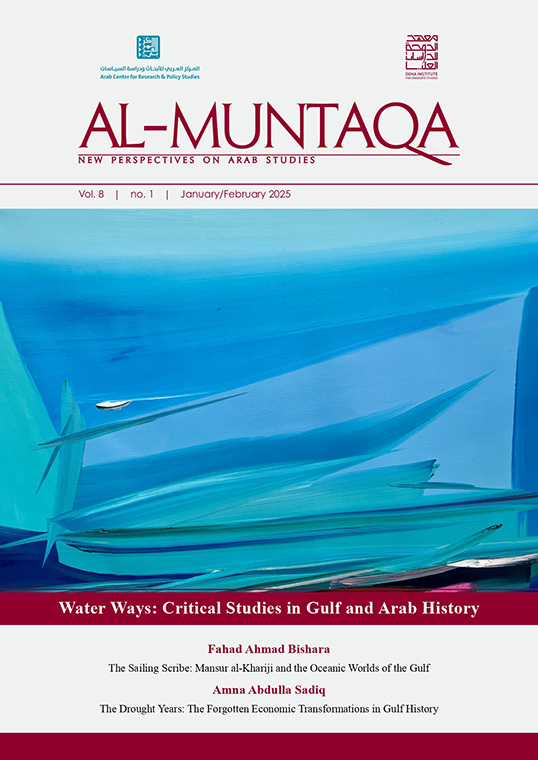 The Arab Center for Research and Policy Studies and the Doha Institute for Graduate Studies have published Issue 18 (January/February 2025) of the peer-reviewed English language journal Al-Muntaqa: New Perspectives on Arab Studies. The collection comprises a special issue on “Water Ways: Critical Studies in Gulf and Arab History”, including an introduction by the guest editor Ismail Nashef, in addition to the four studies. It also features an additional study, an interview, an analysis of the Arab Opinion Index survey, and one book review.
The Arab Center for Research and Policy Studies and the Doha Institute for Graduate Studies have published Issue 18 (January/February 2025) of the peer-reviewed English language journal Al-Muntaqa: New Perspectives on Arab Studies. The collection comprises a special issue on “Water Ways: Critical Studies in Gulf and Arab History”, including an introduction by the guest editor Ismail Nashef, in addition to the four studies. It also features an additional study, an interview, an analysis of the Arab Opinion Index survey, and one book review.
Guest editor Ismail Nashef introduces Water Studies as a growing field of intellectual inquiry and discusses the original contributions of the essays selected for publication in that they examine water as a site of profound epistemological, theoretical, and methodological inquiry. These studies, Nashef argues, are critical and depart away from traditional studies that have been marked by sharp disciplinary divides. They uncover the epistemological significance of water across various contemporary and historical contexts and open up to critically reconsider the one-dimensional reliance on land as the starting point for research.
The opening article in the special issue by Fahad Ahmad Bishara, titled “The Sailing Scribe: Mansur al-Khariji and the Oceanic Worlds of the Gulf”, draws on the writings of one Kuwaiti nakhoda, Mansur bin Ibrahim al-Khariji (1879-1954), which include notes on navigation, transactions, and the political geographies he crossed and shed light on the workings of a world in motion; of institutions and ideas that animated circulation around the Gulf and Indian Ocean.
In “The Drought Years: The Forgotten Economic Transformations in Gulf History”, Amna Abdulla Sadiq discusses a transformative phase in the history of trade in the Gulf and the Indian Ocean, as a result of the expansion of World War II into the passages and ports of the Indian Ocean until the early 1950s, when countries in the region suffered from British austerity measures, marking a turning point from pearl to oil-based economies.
Faozi Al-Goidi’s “The Sea vs. the Desert: Rahmah ibn Jabir and the Dialectic of Piracy and Maritime Influence” examines the figure of Sheikh Rahmah ibn Jabir, whose influence emerged in the late 18th century, and whose network’s activity operated across three key centres along the Gulf shores, without a defined political domain on land, unlike land-based tribal leaders. It proposes the term “maritime sheikhdom” as an alternative to “piracy” to better capture what delineates it from land sheikhdoms.
In “Star-Tied Water: Tracing Life in a Colonized Palestinian Village During the Anthropocene”, Yasmeen Qadan focuses on the practice of star-tying water to trace practices that sustain the continuity of life in Palestinian villages, approaching practitioners intimately through a methodology of slowness. It examines the Anthropocene as an embodiment of accelerated time deeply intertwined with modernity, colonialism, and capitalism.
The collection also includes an additional study titled “The Litani as a Link: Toward a Better Reconstruction in Lebanon” by Hussein Abdulmunim Amery, which addresses the vital importance of the Litani River in Lebanon and the environmental challenges resulting from its severe pollution. The study argues that Lebanon’s water crisis is deeply rooted in political fragility, inadequate governmental response, the sectarian political system, the aftermath of the civil war, and pervasive poverty.
Al-Muntaqa 18 also features an interview with Kate Rouhana, Founding Director of Jerusalem Story, titled ““Jerusalem should be open and available to all”: A Conversation about Jerusalem Story with Kate Rouhana”, in which she sheds light on the website’s mission to offer in-depth research, analysis, and coverage of the Palestinian community in Jerusalem. The site blends rigorous research with journalistic and personal narratives, offering a comprehensive account of the city’s realities.
In the Arab Opinion Index Analysis section, Adel Maalel’s “Social Media’s Socio-Cultural Impacts: An Analysis of the 2022 Arab Opinion Index” analyses the socio-cultural impacts of social media in Arab public opinion based on the results of the eighth Arab Index survey, conducted in 2022 by the Arab Center for Research and Policy Studies in 14 Arab countries.
The collection concludes with a book review essay. Hichem Charfi reviews As-Saghira Ben Hamida’s The History and Memory of the Sea in Modern Tunisia: Between the Oral and the Written.